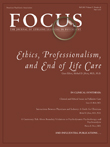Medical ethics is the application of broad philosophical principles to specific clinical decisions. It is the interface between questions that have faced physicians throughout history with dilemmas that are as current as the latest scientific data.
Medicine has always hovered near the limits of human experience, giving a unique perspective and weight to the moral choices physicians encounter daily. The human mysteries of life, death, suffering, and healing, touch most individuals only a handful of times, but touch physicians in every patient interaction. Psychiatrists may spend less time with death and dying but have no less experience with human suffering. The exploration of that experience, with the revelation and exposure it may entail, creates relationships of depth and trust, as well as vulnerability.
This issue of Focus is devoted to these ethical dilemmas, explored through new additions to the literature and review of influential writings of the last few years. The selection is not intended to be comprehensive but to highlight a handful of particularly pertinent issues, many of which are still evolving in professional and popular thought and all of which require our attention.
Physicians have forever been faced with the challenge of boundaries. Our work requires us to probe areas of the body and the mind that remain untouched in every other human interaction. The boundaries are particularly obscure in psychiatry, where it can be difficult to know with certainty where therapy ends and exploitation begins. Little wonder, then, that even the great pioneers of the profession struggled, and occasionally failed by modern standards, to find where the limits should be drawn. There is much to be learned from their blind spots about their times and about our own. It is an opportunity to reflect not only on where that path leads but more importantly where it begins, if it is to be avoided.
Through most of the history of medicine, physicians had little capacity to alter the course of illness but focused instead on the relief of suffering. In modern times that approach has carried the taint of futility or failure. Only recently has it been rehabilitated in the field of palliative care, but the profession has not yet come to accept such care as fully legitimate and beneficial. A reframing of our thinking is in order. Quality of life is meaningful and its enhancement is a benefit our patients deserve. For psychiatrists the dilemma is how to guide a patient through an exploration of these issues without imposing the standards of the profession on the will of the patient but without compromising those standards in our own behavior.
At least one question has never been encountered before: how should physicians interact with the pharmaceutical industry? Few questions generate the depth of feeling of this one and the debates are heated, if not always enlightened. The thoughtful and informed physician needs to reflect on the nature of that relationship, its benefits and its pitfalls. It requires a review of the small but important empirical literature regarding how physicians make decisions and how those decisions can be influenced by unanticipated factors. It requires self-examination and recognition of the unconscious, sometimes self-serving, factors that influence clinical decisions. Perhaps this discussion is not so new after all, for those issues were around long before the pharmaceutical industry and this old dilemma is simply being played out in a new arena.
In each of these areas an ageless question is being explored within a contemporary setting. The purpose of his special topic issue is to provide the reader with the background information, the analytical tools, and the practical guidance to take the discussion beyond the classroom into the clinic, not only to reflect on the issues but also to change the way we deal with them every day.

